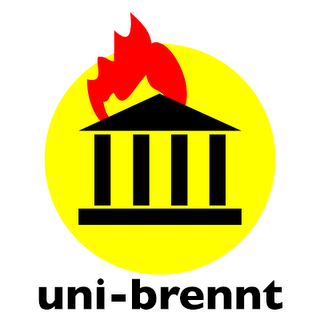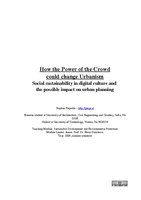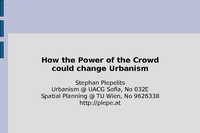Antje Schrupp, deren Blog ich seit einiger Zeit ganz gerne lese, hat vor einigen Tag etwas über die Veröffentlichung des Buches über Wikileaks von Daniel Domscheit-Berg geschrieben. Das hab ich als Anlass genommen, meine eigenen Gedanken zu Wikileaks als Kommentar niederzuschreiben. Da ich das auch mit meinen anderen LeserInnen teilen möchte, veröffentliche ich das somit auch hier:
Ich hab so wie Viele in der letzten Zeit viel über Wikileaks nachgedacht. Ich finde Wikileaks bzw. die Möglichkeit unangenehme Information anonym veröffentlichen zu können eine wichtige Sache. Das Problem ist nur, dass hinter Organisationen Menschen stehen, die angreifbar sind und durch ihre Aktivität in Machtstrukturen hineingeraten. Außerdem entsteht in einer Organisation zwangsläufig Gruppendynamik, die nicht notwendig ist und der Sache meist nur schadet. Ich glaub für ein erfolgreiches Wikileaks müssen folgende Notwendigkeiten erfüllt werden:
Dezentralität: Es sollte nicht möglich sein, die Information zu unterdrücken. Als die US-Depeschen veröffentlicht wurden, haben tausende Organisationen weltweit Wikileaks-Mirrors erstellt, damit niemand Wikileaks offline nehmen kann. Man müsste alle offline nehmen, und mit jeder Website die offline genommen wird, kommen drei nach (wie die Hydra in der griechischen Mythologie). Was wäre wenn diese Mirrors nicht nur die Information spiegeln, sondern wiederum die Möglichkeit zur Veröffentlichung haben?
Lokalität: Eine Organisation die Wikileaks betreibt,wird früher oder später zu klein sein. Wenn die involvierten Personen alle zugespielten Informationen zuerst sichten und bei Bedarf anonymisieren müssen, ist das ein wahnsinniger Aufwand. Das führt automatisch dazu, dass dann nur die brisantesten Informationen wirklich veröffentlicht werden. Ich hab auf anderen Blogs gelesen, dass Wikileaks auch Informationen kleinerer Länder (im konkreten Fall Österreich) zugespielt wurden, die dann aber nie bearbeitet wurden. Hier seh ich auch das Sprachproblem: wenn in der Organisation niemand der Sprache der Informationen mächtig ist, bedeutet das automatisch ein Aus. D.h. Jede Region, jede Sprache, jede Sache gegen die gekämpft werden soll, sollte die Möglichkeit haben eine eigene Wikileaks-(Unter-)Organisation zu gründen.
Vernetzung: Jede dieser lokalen, dezentral organisierten Wikieaks sollte auf Ressourcen der anderen zurückgreifen können. Z.b. falls sie durch Zensur bedroht sind oder weil sie zusätzliche Arbeitskräfte benötigen um einer etwaigen Informationsflut Herr/Frau zu werden oder falls sie keine Ressourcen haben um die technischen Anforderungen (Internet-Zugang, Server, ) zu bewältigen.
Ich weiß nicht, ob die werten LeserInnen dieses Blogs mit BitTorrent vertraut sind. Das ist eine Internettechnologie für Filesharing. Die Theorie ist gar nicht so schwer: Alice möchte eine Datei (wichtige_information.doc) mit anderen Leuten teilen, dazu sagt sie das einem sogenannten Tracker (eine Art Adressbuch). Bob, der diese Datei haben möchte, fragt den Tracker nach dieser Datei. Tracker sagt, dass Alice die Datei hat, worauf sich Bob den ersten Teil von Alice herunterlädt (die Datei ist groß, darum wird sie in mehrere Teile geteilt). Jetzt kommt Charly, er möchte auch die Datei haben. Der Tracker sagt ihm jetzt, dass Alice die Datei komplett hat, Bob hat ausserdem den ersten Teil. Charly lädt sich den ersten Teil von Bob und den zweiten Teil von Alice. Sobald Alice alle Teile entweder an Bob oder an Charly verteilt hat, kann sie ihren Computer abschalten, da Bob und Charly die restlichen Teile selber austauschen können bzw. an weitere Leute weitergeben können. Nur der Tracker (und da kanns auch mehrere geben) muss darüber Bescheid wissen, wer welche Teile der Datei hat. Sobald Bob und Charly die vollständige Datei haben, sind sie mit Alice gleichwertig, es ist (vermutlich) nicht mal mehr nachvollziehbar, wer ursprünglich die Datei veröffentlicht hat.
Damit kann man Informationen in die Internetwolke auslagern. Solange es genug Leute gibt, die zumindest ein paar Teile der Datei haben damit sie ein Ganzes ergeben, bleibt die vollständige Information im Internet. ZensorInnen hätten im Prinzip keine Chance die Informationen wieder zu entfernen, sie müssten jeden einzelnen Computer der einen Teil der Datei hat abschalten.
Das Prinzip des Bittorrent im Internet gehört aber noch weiterentwickelt. Derzeit ist die Bedienung noch viel zu technisch und nur für das Verteilen von Dateien gedacht. Im Prinzip ist das World Wide Web auch nichts anderes als ein Verteilen von Dateien, nur dass diese gleich dargestellt werden und die technischen Hintergründe für die BenutzerInnen verschleiert werden. Warum sollte so etwas nicht auch für Bittorrent möglich sein? Für die BenutzerInnen sollte es unwichtig sein, ob sie die Informationen von einem Webserver oder aus der Cloud empfangen werden.
Ich denke das könnte eine Basis für ein dezentrales, vernetztes Wikileaks oder noch besser ein neues World Wide Web darstellen. Ich hoffe, ich konnte ein paar interessante Gedanken in die Diskussion einstreuen. Würde mich über weitere Gedanken freuen :)
 Es begann an der Akademie der bildenden Künste, an der die Einführung von Studiengängen nach dem Bologna-System kurz bevor steht, eine Folge des im Sommer novellierten Universitätsgesetzes. Eine Änderung, die weder bei Lehrenden noch Studierenden auf Gegenliebe stößt, gilt der Bachelorabschluß doch als minderwertig. Jedenfalls wurde im Anschluß an diese Pressekonferenz beschlossen, aus Protest die Aula zu besetzen.
Es begann an der Akademie der bildenden Künste, an der die Einführung von Studiengängen nach dem Bologna-System kurz bevor steht, eine Folge des im Sommer novellierten Universitätsgesetzes. Eine Änderung, die weder bei Lehrenden noch Studierenden auf Gegenliebe stößt, gilt der Bachelorabschluß doch als minderwertig. Jedenfalls wurde im Anschluß an diese Pressekonferenz beschlossen, aus Protest die Aula zu besetzen.
